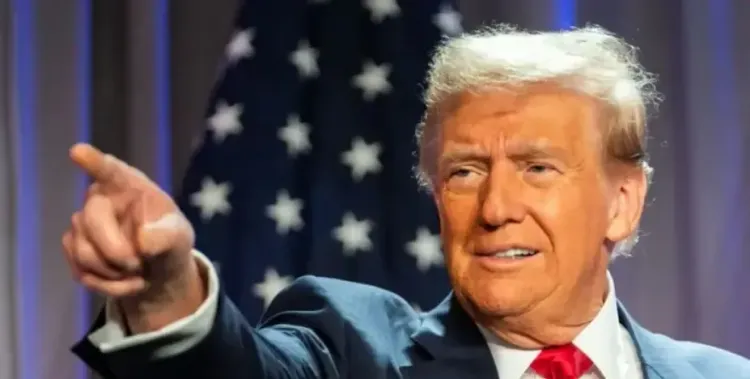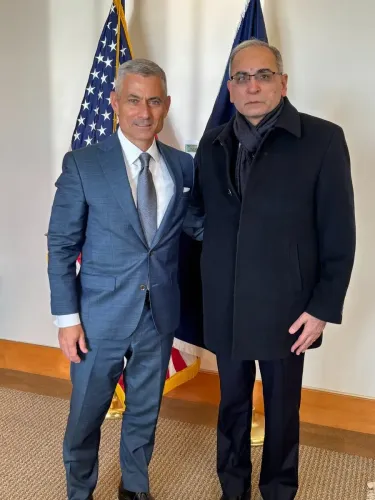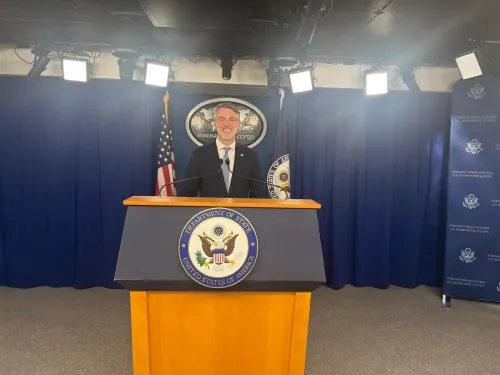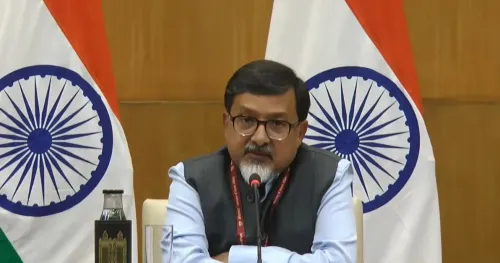Similar to the US, Germans are fed up with the 'illogical' agenda: Trump praises Conservative victory

Synopsis
Key Takeaways
- Trump celebrates conservative victory in Germany.
- CDU/CSU secures 28.5% of votes.
- Voter turnout reached 84%, the highest since 1990.
- Coalition negotiations will shape Germany's next government.
- AfD has nearly doubled its support since 2021.
Washington, Feb 24 (NationPress) Following the exit polls indicating a decisive victory for the conservative coalition in Germany, US President Donald Trump applauded the outcome, asserting that the public has grown weary of the "illogical" agenda.
On his social media platform, Truth Social, Trump shared, "It appears that the Conservative Party in Germany has won a significant and eagerly awaited election. Just like in the USA, the citizens of Germany have become fatigued by the illogical agenda, particularly regarding energy and immigration, which has dominated for years. This is a wonderful day for Germany."
In the meantime, Germany's conservative alliance, comprising the Christian Democratic Union (CDU) and the Christian Social Union (CSU), has emerged as the frontrunner in the nation's 2025 federal election, according to initial results.
As per the latest vote counts from ARD, the CDU/CSU garnered 28.5 percent of the votes, followed by the Alternative for Germany (AfD) with 20.6 percent and the Social Democratic Party (SPD) with 16.5 percent, as reported by German public broadcaster ARD on Sunday evening.
The Greens ranked fourth with 11.8 percent, ahead of Die Linke, which secured 8.7 percent. The Free Democratic Party (FDP) and the Sahra Wagenknecht Alliance (BSW) are projected to receive 4.4 percent and 4.9 percent, respectively, according to Xinhua news agency, citing ARD results.
This election will shape the makeup of the next Bundestag, Germany's lower parliamentary house. A party needs at least 5 percent of the national vote to gain representation in the Bundestag.
According to ARD, the voter turnout for this election reached 84 percent, the highest since 1990. The newly elected parliament will choose Germany's next chancellor following coalition discussions among parties.
Friedrich Merz, the CDU/CSU's chancellor candidate, pledged to act quickly in establishing a new government. "Tonight, we will celebrate, and from tomorrow we will commence our work," Merz stated after the vote. "The world outside is not waiting for us."
German Chancellor Olaf Scholz acknowledged the SPD's significant defeat, asserting that he would remain in office until a new coalition government is formed.
"This is a painful election outcome for the Social Democratic Party, and it is indeed a defeat in the elections," Scholz remarked. "I take responsibility for the election results."
Christian Lindner, who has been the FDP chairman for over 11 years, announced on social media his retirement from politics following the election.
The FDP exited the ruling coalition last year due to disagreements with Scholz's SPD.
Conversely, the AfD has nearly doubled its results from the 2021 election. Alice Weidel, co-leader of the AfD, claimed that her party is now firmly entrenched in mainstream society, labeling the election as the "historically strongest result."
The AfD has expressed its openness to collaborate with the CDU/CSU in the forthcoming coalition talks. However, Merz has dismissed the idea of forming a coalition with the AfD.
Collaboration with the AfD has long been regarded as taboo by Germany's major political factions.
While recognizing the challenges of forming a government under the current circumstances, Merz stated that he aims to have a government established by Easter.
On diplomatic matters, he underscored the necessity of progressively strengthening Europe, aiming for independence from the United States. During an appearance on ARD and ZDF's TV show "Berliner Runde," Merz highlighted that the Trump administration has been "largely indifferent" to Europe's fate.









